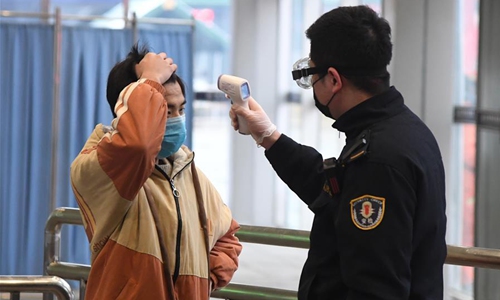
A staff member measures temperature for a passenger at Beijing West Railway Station in Beijing, capital of China, Feb. 2, 2020. Chinese authorities have tightened measures to battle the novel coronavirus epidemic as a growing number of people hit the road and return to work after the Spring Festival holiday. (Photo by Ren Chao/Xinhua)
It is highly unlikely that China will ask the US government to delay the implementation of the phase one trade agreement signed in January.
Although the outbreak of the novel coronavirus will postpone China's purchase plan of US goods in the first quarter this year, Chinese companies can scale up purchase during the rest of the year to make up for the void, as the obligation is measured in yearly terms, analysts said.
The comment comes after the Bloomberg claimed that Chinese officials would plan to request the US government "at some point" for some flexibility on clauses stated in their phase one trade deal due to the onslaught of the deadly virus.
The deal, signed by China and US governments on January, 15, has included a term that states China and the US will consult if "a natural disaster or other unforeseeable events" delays one party from timely complying with its obligation. The deal is slated to take effect within 30 days from signing or no later than February 14.
But Chinese analysts, while showing confidence in China's ability to honor its commitment, said the chance for China to ask for a delay in contrast implementation is very slim despite apparent disruptions triggered by the virus epidemic.
"As some government departments and companies are yet to decide the date of resuming work, inevitably Chinese firms' purchase of US goods will also be delayed in the first quarter," Gao Lingyun, an expert at the Chinese Academy of Social Sciences in Beijing, closely associated with the trade talks, told the Global Times Tuesday.
Gao stressed the virus will only slow down China's purchase plan rather than cutting down purchase from the US market.
"As the virus gradually fades, Chinese firms will be able to achieve the annual purchase plan by buying more in the second quarter and the second half of the year," he said, noting that some companies are mentally prepared for the current difficulty.
Under the phase one agreement, China has agreed to increase the purchase of US farm, energy, and manufactured goods as well as services by at least $200 billion over the next two years, while the US has also agreed to reduce tariffs on Chinese goods.
Chinese have the tradition of "sooner rather than later," which means Chinese companies will also look to complete their obligations adhering to "the earlier, the better," Gao added.
The Chinese Ministry of Commerce has not responded to an interview request from the Global Times as of press time.
However, if the Chinese economy in the first two months falls largely short of expectation due to the fallout of the virus, Beijing may take account of the situation, evaluate its impact, and consult with the US accordingly, other observers said.
"China has the right to do so. It is also in line with the international law," Gao reminded.

